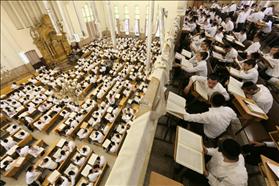A Shared Concern
Ultra-Orthodox Schools in Belgium and England face sanctions for selective curricula
Israel, Belgium, and England share the common challenge of integrating core curricular subjects into ultra-Orthodox classrooms.
22/04/2014 16:33
Tags: core curriculum · education · haredi · ultra-Orthodox

Students return to the Ponevezh Yeshiva in Bnei Brak after summer vacation for studies leading up to the High Holidays.
The ultra-Orthodox Jewish communities in Belgium and England are battling over their education- and want to keep it a closed matter. Until now, the Belgian and British haredi communities have refused to teach certain subjects, such as evolution and sexual education. This could drastically change now that Department of Education officials in these two countries have adopted policies that place economic and criminal sanctions on schools in these communities that continue to leave these crucial subjects out of the classroom.
The British newspaper, "Telegraph" recently reported that British ultra-Orthodox schools illegally modified certain aspects of the national tests administered to their students. The schools erased questions that dealt with evolution and sexual education. Following this discovery, 52 tests were deemed invalid and it was announced that all schools that similarly modify the tests will be placed under sanctions.
The BBC reported that the Office of Qualifications and and Examination Regulations sent out a notice was to all testing committees in the country. "Erasing questions in national tests is a crime and it must be outlawed," the notice read. A representative of the National Association of Orthodox Jewish Schools said that they were working hard to make sure that this "very disturbing problem" would soon be solved.
Raising the Bar in Belgium
In Belgium, there is a compulsory education law that allows free education for every student. In order to receive the government funding, all students are required to study certain core subjects and among them are also evolution and sexual education.
Belgian education activist Aaron Melinski said that until now ultra-Orthodox schools were considered homeschooling, where the parents teach their children. This definition exempted the students from the general studies that all over Belgian students learn in their schools.
However, recently, education officials have begun to enact sanctions against haredi schools. "Satmar hassidim tried to turn to the European courts to receive permission to teach their students at home or to have the "cheider" (ultra-Orthodox Hebrew school) be considered homeschooling," Melinski said. But in recent weeks education officials have demanded that every school teach according to the required criteria, with the threat of losing funding for non-compliance.
These recent confrontations between the Belgium and English educational authorities and their respective ultra-Orthodox communities draw a direct parallel to the issue of core curricular studies in Israel.
Schools that refuse to comply with the government standards with lose thousands of Euros each year. Also, private Jewish schools that do not receive complete government funding will be forced to comply with the education ministry's standards. "For us, the implementation of these laws means exile," Menachem, a Satmar Hassid and father of 10 in Antwerp told the Jewish Telegraphic Agency. "I prefer to send my children to England. It will be very difficult, but it's better than having their minds poisoned."
According to studies that were recently published in Belgium, about 25% of ultra-Orthodox citizens live under the poverty line, compared to 10% of the general population. Only 8.6% of graduates of Haredi educational institutions in Belgium go on to higher education, as opposed to almost 50% of the general population.
Israel and the Diaspora: A Shared Concern
These recent confrontations between the Belgium and English educational authorities and their respective ultra-Orthodox communities draw a direct parallel to the issue of core curricular studies in Israel. Ultra-Orthodox educational institutions in Israel receive funding from the Israeli government, yet many do not adequately teach- or do not teach at all- the subjects that are necessary to integrate into the Israeli workforce, such as English, Mathematics, citizenship, and science.
The ultra-Orthodox sector in Israel similarly has lower employment rates and still has yet to fully implement the core curriculum in its schools. This would play a significant role in better integrating haredi Israelis into Israel's workforce and bringing more members of their communities above the poverty line.
As the amount of first-graders in haredi schools in Israel reaches close to one-third of the Jewish population, many organizations, politicians, and education experts have identified this as one of the key threats to Israel's survival and sustainability. Hiddush's 2013 Religion and State Index found that 79% of Israelis believe the government should require ultra-Orthodox schools to teach core curricular subjects. Similarly, 63% of Israelis believe the government should suspend funding to schools that do not teach the core curriculum.
More about the core curriculum in ultra-Orthodox Israeli schools.